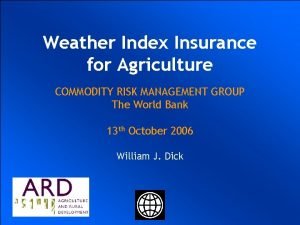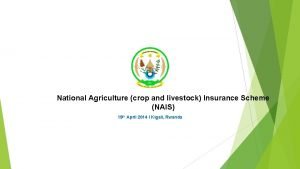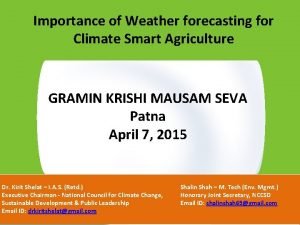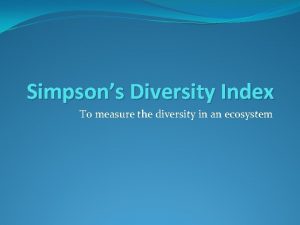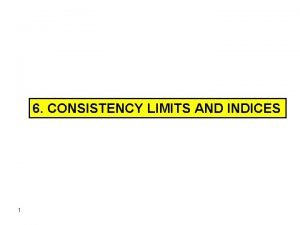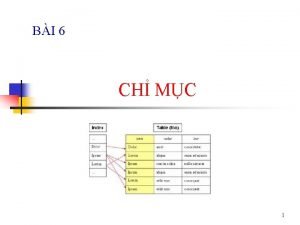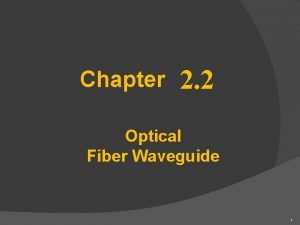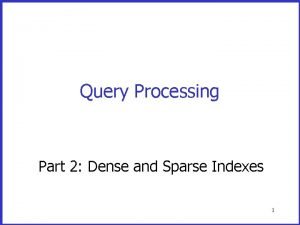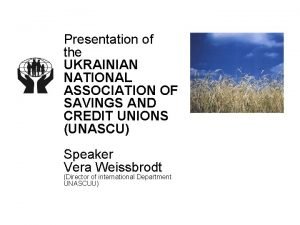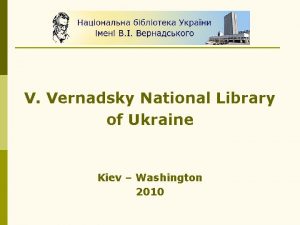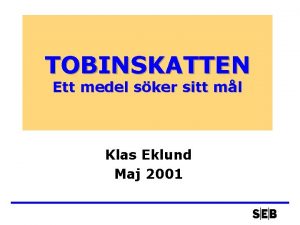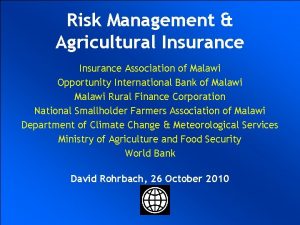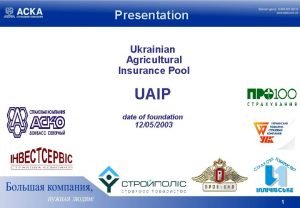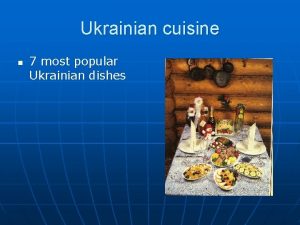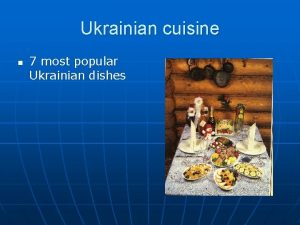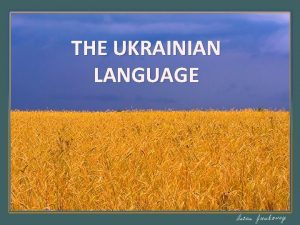Weather Index Insurance UKRAINIAN AGRICULTURAL for Agriculture WEATHER






























- Slides: 30

Weather Index Insurance UKRAINIAN AGRICULTURAL for Agriculture WEATHER RISK MANAGEMENT COMMODITY RISK MANAGEMENT GROUP The World Bank WORLD BANK COMMODITY RISK MANAGEMENT GROUP IFC PEP Ukraine th 13 October 2006 Ulrich Hess Joanna Syroka Ulrich Hess. Ph. D William J. Dick Joanna Syroka Ph. D January 20 22 2004

OUTLINE Overview of the Commodity Risk Management Group (CRMG), the World Bank Index-based Weather Insurance How to develop a Weather Insurance program? Extending the index concept to flood insurance

CRMG Overview

CRMG facilitates…. Market-based Risk Transfer Products Weather index-based insurance Price risk management contracts New Applications Disaster risk financing Extension to new hazards Access to risk capital Access to global reinsurance markets Knowledge Transfer and Education Technical assistance in projects Publications and training workshops Existing Transactions India, Ethiopia, Malawi, Ukraine. …

CRMG global activities 2005 2002 2004 2006 2001 2003 Feasibility Study Pilot Design Pilot Implementation

New Model: Index-based Weather Insurance

Motivation Traditional crop insurance Multi-Peril Crop Insurance (MPCI) • Yield-based insurance is not sustainable Named peril Crop Insurance • Damage-based insurance is viable for selected localised perils Main Problems Loss adjustment and farm level data Moral hazard Adverse selection due to asymmetric information High monitoring and administrative costs Often heavily subsidised Operationally difficult for small farmer agriculture

Experience with public crop insurance Condition for sustainability: (A+I)/P < 1 Where: A = average administrative cost I = average indemnities paid P = average premiums paid Financial performance of crop insurance Country Period (A+I)/P Brazil 75 -81 4. 57 Costa Rica 70 -89 2. 80 Japan 85 -89 2. 60 Mexico 80 -89 3. 65 Philippines 81 -89 5. 74 USA 80 -89 2. 42 Source: Hazell

Index insurance Challenge Design an alternative, efficient and cost-effective crop failure insurance program that facilitates risk transfer and is feasible for small farmers in low-income countries.

What are index insurance contracts ? An index insurance contract indemnifies based on the value of an “index”- not on losses measured in the field An index is a variable that is highly correlated with losses and that cannot be influenced by the insured Example indices: rainfall, temperature, regional yield, river levels Index insurance contracts overcome most of the supply side problems of traditional insurance contracts

Main characteristics of an index Observable and easily measured Objective Transparent Independently verifiable Able to be reported in a timely manner Stable and sustainable over time Weather indexes can form the basis of an insurance contract that protects farmers from weather risk

Payout structure: drought protection EXAMPLE OF PAYOUT STRUCTURE Financial payout increment per mm Payout (unit per ha) Maximum Payout Long-Term Average Rainfall Trigger Rainfall Level Deficit Rainfall Index (mm. )

Index insurance: Advantages and challenges Advantages Challenges Less moral hazard and adverse selection Basis Risk Timely payout Sustainability of the index Lower administrative costs Precise actuarial modeling Standardized and transparent structure Education Availability and negotiability Market Size Reinsurance acceptability Forecast Versatility Micro climates

How can index instruments be used ? Micro level Weather-indexed insurance for smallholder farmers, intermediated through institutions with rural outreach Ex. India, Nicaragua, Malawi, Ukraine Meso level Weather-indexed portfolio hedge for rural financial institutions that lend to poor farmers Ex. India Macro level Weather insurance or weather-indexed contingent credit line for governments or international organizations that provide safety nets for the poor Ex. Ethiopia, Malawi

The global market Deals transacted: Argentina I – Weather insured seed credit Argentina II – Dairy yield protection against low rainfall South Africa – Apple co-operative freeze cover India – Approximately 250, 000 insured against poor monsoon Mexico – Crop insurance portfolio reinsurance through weather derivative structure Canada (Ontario) - Forage insurance with weather indexation Canada (Alberta) - Heat index insurance for maize Ukraine – Winter wheat protection against weather risks Malawi – Weather insurance pilot for groundnut farmers Ethiopia – WFP Drought Insurance Under preparation: Morocco – Wheat yield protection against drought Zambia – Maize yield protection against drought Nicaragua – Bank-intermediated weather insurance for groundnut farmers Thailand – Bank-intermediated weather insurance

How to develop a weather insurance program ?

Developing a pilot program I. Identify significant farmer exposure to weather II. Quantify the impact of adverse weather on their revenues III. Structure a contract that pays out when adverse weather occurs IV. Execute contract (with insurers and a delivery channel) V. Secure international reinsurance

High Probability, Low Consequence Risks Vs. Low Probability, High Consequence Risks Low probability High probability Low probability Extreme weather events (droughts) Normal weather Extreme weather events (excess rainfall or flood) The producers generally perceive this as their risk High Consequence Low Consequence High Consequence Extremely low yields Reduced yields Extremely low yields

The cropping calendar *Maize yields are particularly sensitive to rainfall during the tasseling stage and the yield formation stage – rainfall during the latter phase determines the size of the maize grain Sowing and establishment period is also critical crop survival Diagram taken from the FAO’s maize water requirement report* • A rainfall index is normally split into 3 or more crop growth phases • Objective: maximise the correlation between index and loss of crop yield

Maize Rainfall Index - example Phase 1 Phase 2 Phase 3 Seedling Emergence to Knee High Vegetative Physiological Maturity Days 30 21 30 Trigger (mm. ) 35 50 60 Limit (mm. ) 15 20 30 Tick size (Baht/mm. /rai) 42 21 21 1, 200 1, 600 1, 700 Sum Insured (Baht/rai)

Index v. maize yield example

Distribution and risk transfer Bank-intermediated weather insurance contracts to farmers Global Reinsurance Companies International National Reinsurance treaty Insurance Company/ Syndicate Contractual relationship (risk transfer, services, operations etc. ) Agricultural Bank Weather insurance contracts Farmers

Weather index insurance - summary The product is simple and weather measurements can be understood by farmers Basis risk can be reduced by increasing the density of low cost weather stations Low cost of distribution and loss adjustment Less specialist knowledge needed to underwrite the product The product is suited for catastrophe hazards The product is highly flexible and can multiply in the insurance market Reinsurers are interested to accept the risk

Extending the concept to flood insurance

The flood risk in Asia

Flood insurance concept Design a flood index which can proxy losses caused to crop Rice is the strategic crop most exposed to flood Flood impact is dependent on variety, time of occurrence, depth, speed and duration of flood water Harness technology to support insurance underwriting and operations 2 key components for index design phase Flood modelling (FM) Agro meteorological modelling (AMM) 2 key components for operational phase Geographical information system Earth Observation (EO)

“Medium Risk” Pricing Zone “High Risk” Pricing Zone LA 1 LA 2 LA 4 Pasak River LA 3 LA 5 “Low Risk” Pricing Zone

Summary: Combining the Technology Components FM + AMM Design a flood index that proxies crop loss FM+EO+GIS Define flood risk zones and pricing the contract EO+ GIS Loss adjustment for payout determination according to the index FM: flood modelling. AMM: Agro-meteorological modelling. EO: Earth observation. GIS: Geographical Information System.

Remote sensing can measure flooded areas Flood assessment based on SAR - Bangladesh 07/2004 Flood map River gauges

Challenges in indexing flood risk Types of flood risk River inundation flood Flash flood Typhoon induced flood Coastal surge flood Challenges Zoning for insurance purposes Defining “macro” or “micro” level insurance products Pricing flood risk Influence of flood management practices on risk Avoidance of anti-selection Simplifying the product CRMG is still in the research phase Thailand, Vietnam and Bangladesh
 Agricultural weather index
Agricultural weather index Agriculture insurance in sri lanka
Agriculture insurance in sri lanka National agriculture insurance scheme
National agriculture insurance scheme Nature of fire insurance contract
Nature of fire insurance contract Importance of weather and climate to agriculture
Importance of weather and climate to agriculture What does the simpson diversity index measure
What does the simpson diversity index measure Bacteriological index
Bacteriological index Consistency index
Consistency index Pqli advantages and disadvantages
Pqli advantages and disadvantages Clustered index và non clustered index
Clustered index và non clustered index Diff between step index and graded index fiber
Diff between step index and graded index fiber Optical fiber waveguides
Optical fiber waveguides Dense secondary index
Dense secondary index Association of ukrainian guides
Association of ukrainian guides History of pysanky
History of pysanky Ukrainian alphabet
Ukrainian alphabet Famous ukrainian americans
Famous ukrainian americans Ukrainian women's association of canada
Ukrainian women's association of canada Ukrainian national credit union association
Ukrainian national credit union association Ukraine ministry of infrastructure
Ukraine ministry of infrastructure Difference between idiom and proverb
Difference between idiom and proverb Ukrainian state center for international education
Ukrainian state center for international education Christ our pascha catechism
Christ our pascha catechism Ukrainian farmers
Ukrainian farmers Vernadsky national library of ukraine
Vernadsky national library of ukraine Ukrainian cookery lessons
Ukrainian cookery lessons Ukranian writers
Ukranian writers Tack för att ni lyssnade bild
Tack för att ni lyssnade bild En lathund för arbete med kontinuitetshantering
En lathund för arbete med kontinuitetshantering Tobinskatten för och nackdelar
Tobinskatten för och nackdelar Atmosfr
Atmosfr
